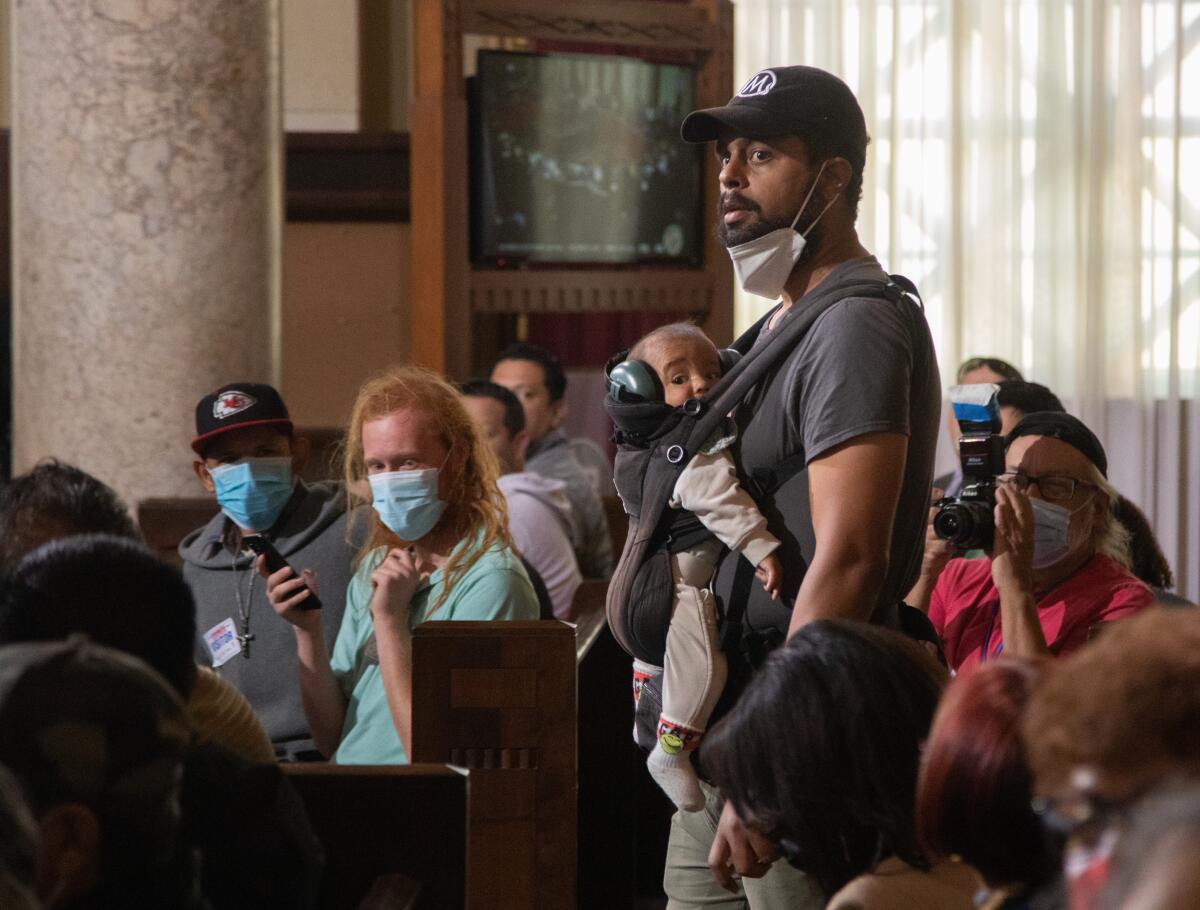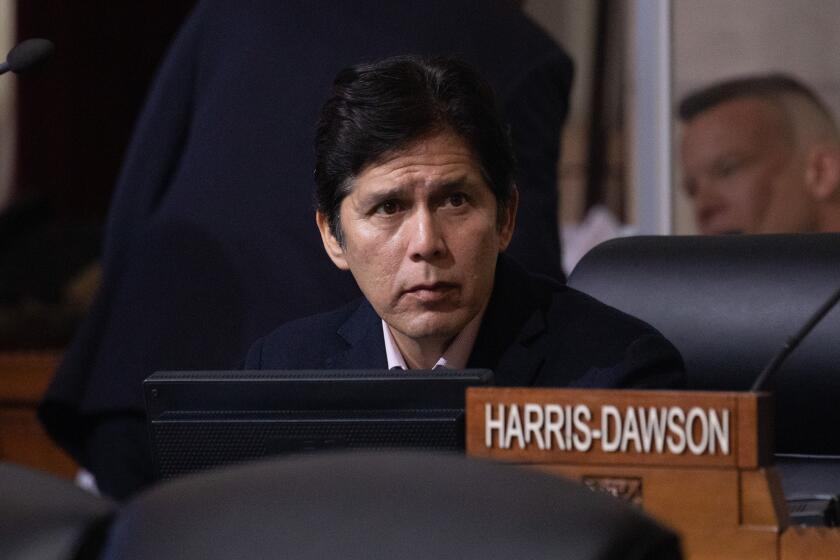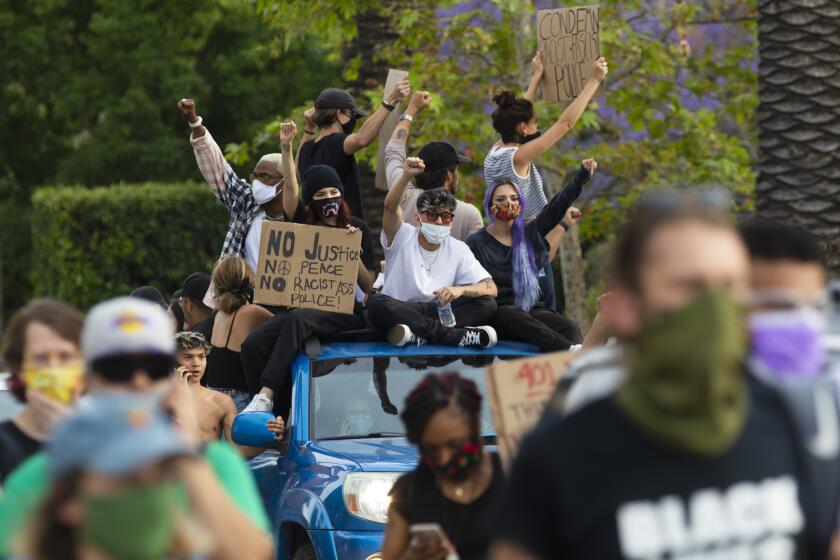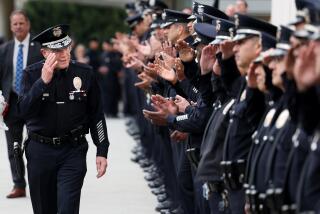Activist’s toddler is at center of LAPD Commission controversy

For months, activist Jason Reedy has been bringing his 14-month-old son to weekly meetings of the Los Angeles Police Commission. But the toddler’s playful romps at the oversight panel have recently become serious business.
One commissioner, a frequent target of Reedy’s demands for greater police accountability, said during one Tuesday morning meeting it “made him sick” Reedy would bring his son to the emotionally charged meetings. Weeks later, LAPD Chief Michel Moore suggested that Reedy was using his child as a shield from criticism.
The unsolicited parenting advice didn’t go over well with many of those who attend the meetings.
“The commission seems more intent on enforcing the rules for people who attend their meetings than they are on enforcing the rules on police officers who commit acts of violence on the job,” Reedy said.
Reedy has been a regular at commission and City Council meetings, along with other outspoken police critics and social justice advocates who show up to criticize what they see as the panel’s willingness to go along with whatever the department wants.
Reedy, who is Black, said he has no doubt that he’s being singled out because of his race, as well as his unflinching criticism of police violence and misconduct. He and other regular meeting attendees argue that the commission’s rules for public comment aren’t applied evenly.
Commissioners try to stick to the three-minute time limit allotted to every speaker, but seem far quicker to cut off critics of the department than those who support the police, they argue. And, they say, certain speakers are allowed to espouse racist, misogynistic or xenophobic views without being admonished.
Steve Soboroff, a longtime commissioner who recently termed out of the position, said in a recent interview that he stands by his comments at an April meeting that it made him “sick” to see Reedy bring his child and then shouting expletives at commission members.
“Don’t tell me if I see something like that going on, that I can’t call it out because I’m a police commissioner. Fire me, then,” he said. “If you think that standing there and screaming and the language, getting right in cops’ faces all the time, if you think that isn’t damaging to a little baby, you are wrong.”
He said that his comments were prompted by Reedy’s confrontational, in-your-face style, and said it had nothing to do with Reedy’s ethnicity.
The council member said in a statement that he was assaulted. Activists said De León was the aggressor.
“I called him out on it, and then he said I was a racist, but I couldn’t see all the way back there,” he said, referring to the back of the room where Reedy was standing during the meeting. “Don’t ask me, get some people from Child Services to come sit in those meetings, to see what they’ll say.”
Another commissioner, attorney William Briggs, who has in the past asked Reedy and others to sit, also questioned whether it’s appropriate to bring young children to the meetings, where “invective, derogatory language and yelling is used.” He wondered about “the effects that would have a on a child.”
“As for activists coming to meetings, they have every right to do so, and voice their opinions on everything we discussed,” Briggs said. “I understand that.”
Police Commission meetings have never been short on drama. Over the years, the proceedings have drawn a diverse cast of characters, from grieving mothers of people who have been shot by police to a man who wears clothes adorned with a swastika.
Department officials say that outbursts from activists have gotten more regular and disruptive in recent years, to the point that it has become nearly impossible for commissioners to carry out their business. The concerns have arisen as a younger generation of activists has opted for more confrontational tactics, such as showing up at the homes of politicians, judges and school board members to get their message across.
In 2015, the commission tried to implement rules that threatened expulsion for anyone who make “repetitious, personal, impertinent or profane remarks.” But the panel later reversed course after the proposal drew a torrent of criticism, including from the American Civil Liberties Union.
Since the coronavirus outbreak began, a growing number of L.A. public officials have seen their homes become the target of protesters.
Under the current guidelines, attendees are afforded one warning for being disruptive before they can be removed from the meeting. Signs are banned. Speakers are instructed to stick to the agenda items from the meeting or policing matters in general, and not to make personal attacks on other attendees. Standing isn’t allowed, with the exception of credentialed members of the media.
There was renewed debate about the rules at the commission meeting last week, when several speakers criticized a string of recent police shootings. At one point, the commission’s president, Erroll Southers, admonished Reedy for standing up. Reedy snapped back that he was tending to his son, who had wandered away from his seat.
After the 45-minute public comment period, several people in the audience argued for more time, pointing out that earlier this year a commissioner had promised that everyone who attends the meetings in person would have a chance to speak. After some back and forth, they were told to leave the room, leading some to shout profanities and insults at commissioners as they were escorted out by officers.
After the room was cleared, Moore said he wanted to express his frustration with such disruptions from “extremist voices,” which he said undermine the activists’ arguments.
“Their ability or willingness to escalate those tactics, as was demonstrated here today, including the use of a child, in my view is not a successful path,” Moore said, apparently referring to Reedy.
At the following week’s meeting, a number of audience members stood up during public comment, in defiance of the commission’s rule.
Activist parents have been bringing their children to protests and rallies for varying causes for decades. But some have reconsidered that approach in recent years in light of the “large-scale surveillance” by law enforcement at such gatherings, according to Safiya Noble, a professor at UCLA in the departments of gender studies and African American studies.
“I’m aware that anybody who goes to any protest is likely to be scanned with facial recognition software, and so I don’t know how kids could be precluded from that,” she said.
Hamid Khan, an organizer with the watchdog group Stop LAPD Spying Coalition, said he heard the chief’s comments later on a recording of the meeting, calling them “just completely vulgar and gross commentary.” Moore’s words, he said, fit a pattern of officials trying to stifle and undermine critical views.
“What he’s trying to do is to discredit he messenger and to shift the focus on the ground, that’s his game,” said Khan, who himself has been escorted out of several commission meetings for speaking out.
Khan acknowledged there is some theatricality to such tactics, but it can ensure that commissioners pay attention because they are sometimes on their phones during the public comment period or seem otherwise distracted.
“It’s a way of expressing your pain and about expressing your trauma, and so people scream,” he said. “This whole notion that we should just be sitting there silently, just like go up and speak for three minutes knowing that nothing’s going to happen, knowing that nobody’s really listening to us … people have to take other actions as well.”
The chief’s comments smack of respectability politics, Reedy said. Instead of responding to the very real concerns raised by community members, leaders like Moore hide behind the facade of civility, he said.
“F— decorum, first and foremost,” he said. “Five people are dying every day on the streets. So if elected officials don’t want people outside of their homes, then maybe they should be doing something about it. Maybe they should do something about the fact that [police] haven’t sustained a racial bias complaint in ... years.”
He said his decision to bring along his toddler has everything to do with the fact that Reedy is his caregiver while his partner is at work and on the commission’s insistence on holding its meetings in the middle of the day.
“To Moore, my child is a pawn and this is all a game,” he said. “They use children for PR all the time, and I don’t use my child. I love my child.”
More to Read
Sign up for Essential California
The most important California stories and recommendations in your inbox every morning.
You may occasionally receive promotional content from the Los Angeles Times.













